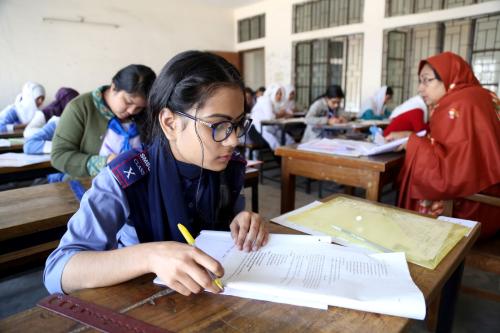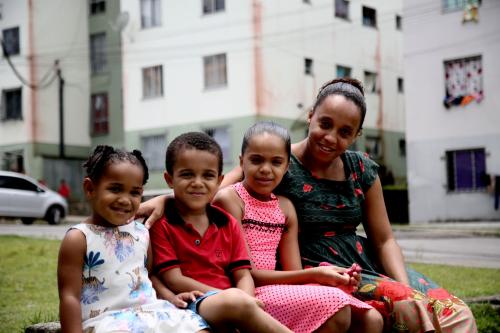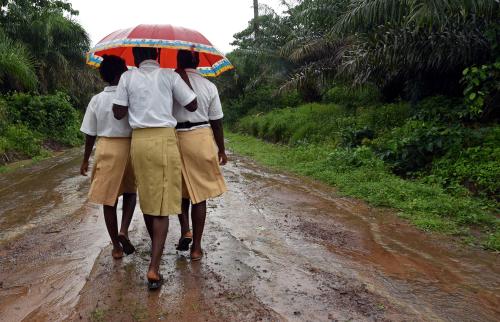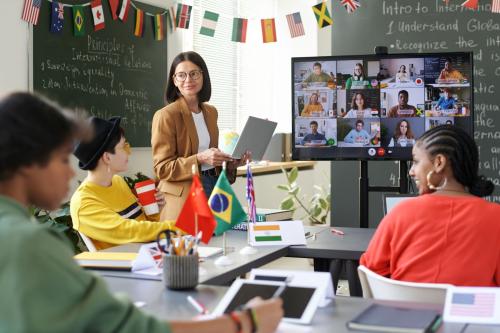


Family-centered education systems position families and communities as essential partners and assets in delivering a shared vision of education, create opportunities to build trusting home-school relationships and honor each other’s knowledge and perspectives, and are committed to collectively supporting student learning, development, and well-being. Partnerships between families, schools, and communities are critical to strengthening and transforming education systems.
The Center for Universal Education co-led the writing and development of a set of policy briefs with collaborating civil society and government institutions on different education systems contexts. These policy reports take the research conducted in the large international study—the Six Global Lessons on How Family, School, and Community Engagement can Transform Education (2024)—and tailor the findings and recommendations to specific countries and regions. The policy reports provide specific strategies and recommendations for building stronger partnerships and relational trust in each context.
Two global briefs on youth engagement in decision making and leadership elevate young people’s voice and role in education systems transformation.
The Government of Bangladesh recognizes the importance of families’ active engagement in their children’s education to ensure student participation, outcomes, and well-being. Secondary students face many barriers to school completion, including high educational costs, pressure to leave school to earn, early marriage, and more. Family engagement and relational trust is critical at this juncture in young people’s lives to ensure they are not only in school but also learning and thriving. This policy brief presents actionable strategies to deepen family, school, and community partnerships in rural and urban secondary schools and build a more family-centered education system.
Read the policy report

Richaa Hoysala, Emily Markovich Morris, Nasrin Siddiqa
November 17, 2025
Although education frameworks at the national, state, and municipal levels in Brazil formally recognize the importance of family engagement, they often fall short in providing concrete and actionable guidance to operationalize family and school partnerships. Drawing on participatory research with families and educators across three states, this policy brief offers evidence-based recommendations to support government institutions and civil society actors in reimagining families, not merely as overseers of attendance or decisionmaking bodies, but as integral partners in advancing equitable and high-quality education.
Read the brief

Laura Nóra, Emily Markovich Morris, Carolina de Oliveira Campos, Vida Marina Barreto Leite, Richaa Hoysala
April 11, 2025
The government of Colombia has recognized family, school, and community engagement—known as Alianza Familia-Escuela—as essential throughout a child’s educational trajectory and has made it central to its education system across all levels. Despite ambitious policy priorities, in practice, these efforts have not yet been fully operationalized as intended in schools. Most notably, not all families are engaging in their children’s schools as aspired, particularly those who do not have flexible and secure work and rely on daily wages. This policy report provides actionable strategies and recommendations to ensure this well-intended policy vision is translated into practice.
Read the report

Emily Markovich Morris, Adelaida Gómez Vergara, Geraldine Fandiño, Richaa Hoysala, Laura Nóra, Hans Cabra +1 more
November 3, 2025
Engaging and partnering with families is a central pillar of the Government of Sierra Leone’s efforts to improve student and school outcomes in their current education policies, frameworks, and plans. The recommendations support government institutions and civil society organizations in expanding the roles and responsibilities of families from a solely accountability role, to one where families are essential partners in supporting learning at home and building deep and equitable participation across communities.
Read the brief

Emily Markovich Morris, Max Lieblich, Laura Nóra, Foday Kalakoh, Miriam Mason-Sesay, Lansana Bakarr, Mohamed Fullah, Francisco Carballo Santiago, Jennifer Artibello +4 more
September 17, 2024
Around the world, students are rarely intentionally and meaningfully involved in the development and implementation of educational visions, policies, and plans. Aimed at education leaders and decision makers, “Prioritizing Student Voice in Education System Decision Making” provides recommendations on how to harness student voice and leadership at the national, subnational, and school levels, from consultations to intergenerational partnerships, and presents an analysis of existing policies and practices of meaningful student engagement globally. “Centering Youth Perspectives and Leadership in Educational Research” (forthcoming) will provide recommendations on how to ensure students have a more active role in designing, implementing, and enacting educational research.
Read the brief

Richaa Hoysala, Emily Markovich Morris, Omaer Naeem
November 21, 2025